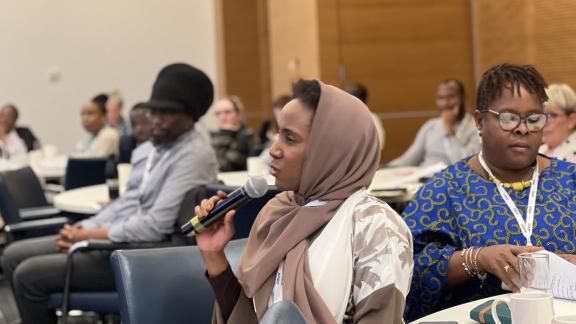The voluntary sector: a game-changer in integrated care systems

With integrated care boards engaging with the VCSE sector to deliver a truly integrated health and care system, Lord Victor Adebowale discusses the full value of partnership working with the voluntary sector.
All over England, millions of vulnerable people and families rely every day on voluntary organisations delivering huge amounts of care on behalf of the NHS or local councils. They have played a critical role during the COVID-19 pandemic, working alongside statutory services to support the health and wellbeing of millions of people. They have made a profound difference to the quality of the lives of many of our elderly and those with disabilities, or living with a mental health condition.
A third sector study, carried out last year by Durham University on behalf of West Yorkshire and Harrogate ICS and Humber, Coast and Vale ICS, has managed to quantify not just in patient outcomes, but financially, the huge difference charities, social enterprises and community organisations make across the regions. It has illustrated that in the Humber, Coast and Vale patch alone the voluntary, community and social enterprise (VCSE) sector contributes an estimated economic and social value of £4.2 billion.[1] In terms of social enterprises alone, according to Social Enterprise UK, over 30 per cent of community services are provided by social enterprises. This includes making public sector savings, building stronger communities and enabling people to have a much better quality of life.
Harnessing the energy
We must harness this, tap into their creativity and resilience, and most importantly support them to do what they do best: cutting across the artificial organisational barriers of health, care, housing, and criminal justice. If we do this right, and in genuine partnership, the future can be much more exciting and much better for individuals.
VCSE bodies should be treated as key partners in the delivery of health and care
That’s why integrated care systems (ICSs) must look and feel different from the past by embracing the VCSE sector like never before. VCSE bodies should be able to build on the work they are undertaking and be treated as key partners in the delivery of health and care.
The new arrangements, which will see an integrated care board (ICB) conducting the core business of the NHS and an integrated care partnership bringing together key local system partners including the VCSE, must represent a significant step change in the relationship between NHS organisations and the voluntary sector, building equity in decision-making and governance.
Guidance for successful partnerships
NHS England and NHS Improvement (NHSEI) has published guidance to support ICBs through the implementation of partnerships. This is critical to successful health and care systems.
There are two important documents in this guidance that are relevant: ICS implementation guidance on partnerships with the voluntary, community and social enterprise sector explains how the VCSE sectors should be embedded in the day-to-day activities of each ICS. This includes through involvement in governance structures and service redesign work, as well as in system workforce, leadership and organisational development plans.
ICS implementation guidance on working with people and communities sets out expectations and principles for how ICBs can develop their approaches for working with people and communities. A strong and effective ICS requires a deep understanding of all the people and communities it serves. The insights and diverse thinking are essential to help ICSs tackle health inequalities and other challenges faced by health and care systems.
Meeting the deadline
By July 2022, ICBs are expected to have developed a formal agreement for engaging and embedding the VCSE sector in system-level governance and decision-making arrangements, ideally by working through a VCSE alliance to reflect the diversity of the sector. These arrangements should build on the involvement of partners in relevant forums at place and neighbourhood level.
We won’t achieve truly integrated health and care without the voluntary sector - it’s that simple
Local voluntary and community organisations often have grown out of local communities to meet specific needs, and can contribute valuable insights that will help an ICS develop new services or to remove barriers to an existing service.
Working example
Somerset ICS has seen thousands of people get faster, joined-up metal healthcare thanks to the Open Mental Health partnership, which includes a 24-hour helpline. The scheme has brought together doctors, nurses, psychologists, and charities such as Age UK, Citizen’s Advice, Rethink Mental Illness and many others. It’s tightly linked the voluntary sector into the NHS through the development of a shared system for recovery and care planning, so all professionals involved in the person’s care will be able to write and respond to each other.
ICSs have been in development over the past four years and have numerous partnerships which are working well to provide health and care. But there is still so much more potential to work together. There are some big players within the VCSE, and they have a national and a local role to play. The sectors have an important contribution to make in shaping, improving and delivering services and developing and implementing plans to tackle the wider determinants of health.
We won’t achieve truly integrated health and care without the voluntary sector - it’s that simple. We must use this opportunity to strengthen work with people and communities, build on their thriving local relationships and create services that really improve the health of all our populations.
Lord Victor Adebowale is chair of the NHS Confederation. Follow him and the organisation on Twitter @Voa1234 @nhsconfed
Footnote
[1] https://humbercoastandvale.org.uk/wp-content/uploads/2021/10/Structure-Dynamics-and-Importance-of-the-VCSE-Sector-Report_September-2021.pdf



